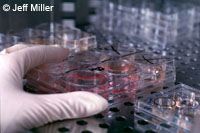EU stem cell deal receives mixed response
Although the agreement on stem cell research at the Competitiveness Council commits the EU only to doing what it has been doing until now, its announcement has nonetheless sparked statements from both the pro- and anti-stem cell research lobbies. Industry has welcomed the agreement, which allows restrictive research using human embryonic stem cells, but not the destruction of embryos for the harvesting of stem cell lines. Research that involves human cloning for reproductive purposes, research intended to modify the genetic heritage of human beings which could make such changes heritable, and research intended to create human embryos solely for the purpose of research or the purpose of stem cell procurement, will not be funded. EuropaBio, the European Association for Bioindustries, has welcomed the agreement, saying: 'Continuing the funding of embryonic stem cells research at European level is a positive signal for European biotech research, which may one day offer hope for patients suffering from diseases like Parkinson's and Alzheimer's.' UK Science Minister Lord Sainsbury also saw the agreement as representing progress for Europe. 'In Europe we are moving forward on this front, whereas America has taken, as far as the federal government is concerned, a very negative position. That Europe is moving forward is extremely good.' On 19 July, US President George W Bush vetoed a Bill that would have lifted the existing restrictions on the federal funding of research using embryonic stem cell lines, as well as the creation of new cell lines from frozen embryos considered surplus in fertility clinics. The compromise reached in the 24 July Competitiveness Council has however been criticised for both not going far enough, and for crossing ethical boundaries. Renowned UK scientist Stephen Hawking declared the decision a 'fudge'. 'As I understand it, as long as the creation of new stem cell lines is paid for from private funds, or national budgets, EU money can be spent on research using these lines. We throw away many embryos in IVF and no-one objects. Isn't it better to use a few embryos to save lives?' he told EducationGuardian.co.uk. The Vatican is opposed to research involving stem cells, and the Vatican newspaper L'Osservatore Romano termed the agreement 'The macabre product of a twisted sense of progress.' Followers of the Roman Catholic Church believe that life begins at conception. A Vatican official responsible for bioethical questions, Monsignor Elio Sgreccia, described the decision as 'grave', and said that it authorises 'the use of human beings, on the basis of 'I kill you to get advantages for others'.' As the European Parliament has now adjourned for the summer, there is no indication as yet as to how MEPs view the agreement. This will however become clear when the FP7 proposal gets its second reading in the Parliament in the autumn.



